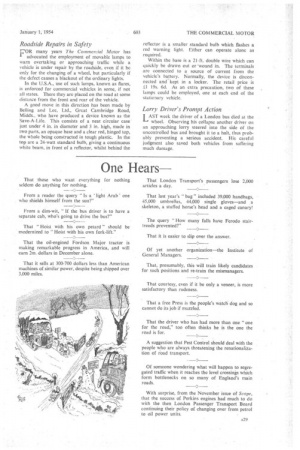One Hears
Page 31

If you've noticed an error in this article please click here to report it so we can fix it.
That those who want everything for nothing seldom do anything for nothing.
From a reader the query "Is a ' light Arab' one who shields himself from the sun?"
From a dim-wit, "If the bus driver is to have a separate cab, who's going to drive the bus?"
That "Hoist with his own petard" should be modernized to "Hoist with his own fork-lift."
That the oil-engined Fordson Major tractor is making remarkable progress in America, and will earn 2m. dollars in December alone.
That it sells at 300-700 dollars less than American machines of similar power, despite being shipped over 3,000 miles. That London Transport's passengers lose 2,000 articles a day.
That last year's " bag " included 39,000 handbags, 45,000 umbrellas, 44,000 single gloves—and a skeleton, a stuffed horse's head and a caged canary!
The query "How many falls have Ferodo stairtreads prevented?"
That it is easier to slip over the answer.
Of yet another organization—the Institute of General Managers.
That, presumably, this will train likely candidates for such positions and re-train the mismanagers.
That courtesy, even if it be only a veneer, is more satisfactory than rudeness.
That a free Press is the people's watch dog and so cannot do its job if muzzled.
That the driver who has had more than one "one for the road," too often thinks he is the one the road is for.
A suggestion that Pest Control should deal with the people who are always threatening the renationalization of road transport.
Of someone wondering what will happen to segregated traffic when it reaches the level crossings which form bottlenecks on so many of England's main roads.
With surprise, from the November issue of Scope, that the success of Perkins engines had much to do with the then London Passenger Transport Board continuing their policy of changing over from petrol to oil power units.




























































































